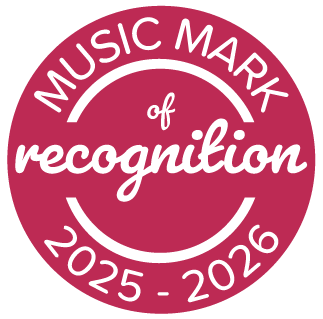Music
Music Mark
West Ashton CE Primary School has been selected to be a 'Music Mark' school for the 2nd year running. This is in recognition of our commitment to high quality music education.
Music is an important part of primary education, and it can enhance children's knowledge-learning, well-being and confidence. We follow the Kapow Scheme of Work to teach primary music from Early Years through to the end of Key Stage 2.
We provide opportunities for all children to create, play, perform and enjoy music, to develop skills and appreciate a wide variety of musical forms. We embrace the National Curriculum purpose of study which states:
"Music is a universal language that embodies one of the highest forms of creativity. A high-quality music education should engage and inspire pupils to develop a love of music and their talent as musicians, and so increase their self-confidence, creativity and sense of achievement. As pupil’s progress, they should develop a critical engagement with music, allowing them to compose, and to listen with discrimination to the best in the musical canon. " National Curriculum 2014
Intent
Our intent in the teaching of music is to enable children to develop skills of:
- singing
- playing tuned and untuned instruments
- improvising and composing music
- listening and responding to music
Implementation
Through our music curriculum, pupils’ understanding of music will be developed by activities which bring together the requirements of performing, composing, listening and appraising. Children are taught to recognise the musical elements of:
- duration
- dynamics
- pitch
- tempo
- timbre
- texture
Children are taught to make music together, to understand musical notation, and to compose pieces. They are also taught to sing and play in time controlling the sound and pace. They are taught different ways to represent sounds graphically and symbolically.
In addition to music lessons, one of the main methods employed to help children to access and engage with music in school is singing. This focuses on developing the children’s ability to sing expressively, in tune and with other people.
Through singing songs, children learn about the structure and organisation of music. We teach them to listen to and appreciate different forms of music from various backgrounds and cultures. Collective Worship songs are also linked to various annual celebrations and festivals such as Harvest, Christmas and Easter.
Children are also taught how to use technology as a tool for creating, manipulating and storing sounds e.g. using Sonic Pi software.
Impact
Music enables children to develop an understanding of culture and history, both in relation to children individually, as well as ethnicities from across the world. They are able to enjoy music in as many ways as they choose – either as listener, creator or performer. Children have the opportunity to discuss and share their own thoughts, opinions and ideas, acknowledging and respecting that these may vary and that this is positive.





